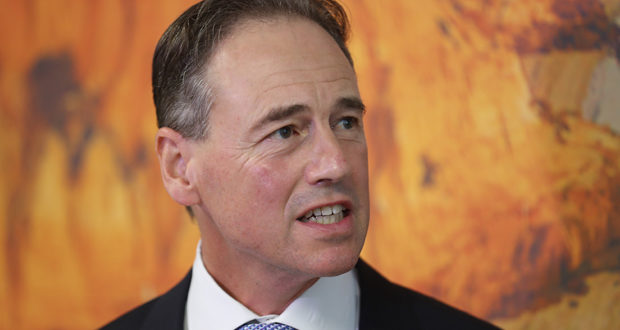Aged care workers in the worst COVID-hit areas of Sydney will be prioritised in the state's vaccine rollout, the government said, as the state enters an extended lockdown.
NSW will prioritise aged care workers and over 10,000 teachers in the Fairfield, Canterbury Bankstown and Liverpool local government areas where there is greater concern of COVID-19 transmission.
A vaccine hub will begin operating at Fairfield Showground on Friday 16 July to vaccinate teachers and aged care workers in those areas.
New vaccination hubs will also be opened in several new locations across NSW, Premier Gladys Berejiklian announced.
- A mass vaccination centre in Belmont, Lake Macquarie will open on Monday 19 July and will have capacity to administer up to 20,000 vaccinations each week.
- A new vaccination clinic in the Sydney CBD will open on Monday 19 July, and will have capacity to administer up to 7,000 vaccinations each week.
- A mass vaccination centre at Macquarie Fields in Sydney’s south-west will open by the end of July and will have capacity to administer up to 20,000 vaccinations each week.
- A mass vaccination centre in Wollongong will open in August and will have capacity to administer up to 15,000 vaccinations each week.
Sydney's lockdown has been extended for "at least" two more weeks until Friday July 30, Premier Gladys Berejiklian said on Wednesday as the state recorded 97 more COVID-19 cases.
“However, we’ll obviously assess the situation at the end of those two weeks and provide information beyond that," she said.
“We are prioritising vaccinating aged care workers and teachers in those key local government areas and Dr Chant’s team and the health advice will tell us what we can and can’t do beyond that two weeks.”
Vaccination still an issue in aged care
Health and aged care minister Greg Hunt has revealed that just 107,000 aged care workers, roughly 40 per cent, had received their first dose of the vaccine.
That is despite the new government deadline to have all aged care workers vaccinated as a mandatory condition of work just two months away, September 17.
“We have a series of ways to ensure that all those vaccinations … can be achieved so everybody is in a position to take that up,” he told reporters on Monday.
The Australian Aged Care Collaboration and the major health unions met with Hunt, Aged Care Services Minister Richard Colbeck, and COVID-19 Vaccine Taskforce commander Lieutenant General John Frewen this week with a set of demands aimed at setting right the vaccine rollout.
The group secured key commitments that they say will help remove barriers to vaccination in aged care, according to the Australian Nursing and Midwifery Journal.
They include:
1. Ensuring access to priority and supply of Pfizer as outlined in the initial rollout plan – all aged care workers regardless of age will have access to Pfizer (though can choose AstraZeneca if preferred or indicated). Unions and providers also requested transparency over and quarantining of supply of Pfizer for aged care workers.
2. On-site workplace vaccination – currently being negotiated through several channels, which include:
‘Self-vaccination’ by aged care facilities with capacity
Continued in-reach by companies previously contracted for aged care in-reach
Engagement of states to assist in delivery of in-reach vaccination
‘Hub and spoke’ arrangement with PHN’s and RACF’s (this model is still being explored)
3. Genuine priority access to vaccination via other channels, e.g. state vaccination hubs and GP clinics – although priority access was already meant to be happening, this has not been occurring in practice. The government committed to ensuring this occurs.
4. Support to access vaccination, and recover from effects if needed, through paid vaccination leave. Unions and providers acknowledged that the initial commitment of $11 million is a good start to support aged care workers but as it only applies to casual employees, is still not good enough. The Minister was clear that he would explore what funding could be organised to extend paid vaccination leave to all workers.
Vaccination deadline up in the air?
“We do have a big challenge ahead of us but what we know, both providers and unions, we know that the problem is that demand continues to outstrip supply,” ANMF federal secretary Annie Butler told ABC's RN program after the meeting.
The joint union/aged care provider group will now meet with the Department of Health and the Vaccination Taskforce three times a week over the next two weeks.
"Monday’s meeting with the Ministers was positive and productive," said Sean Rooney, spokesman for the Australian Aged Care Collaboration.
"Unions and providers again reiterated their strong and united support for vaccination and immunisation and commitment to working cooperatively with the government. We also emphasised that low vaccination rates are an issue of access to vaccine and not hesitancy."
Rooney said that the group will meet with the government again in two weeks to discuss whether the september 17 deadline for mandatory vaccination of workers is still attainable.
"Encouraging and supporting aged care workers to be vaccinated was acknowledged as a shared responsibility. With the sector looking to work with the Government to ensure aged care workers are enabled to get vaccinated as quickly and as safely as possible," he said.
"Minister Hunt reaffirmed that AHPPC will be conducting a risk and benefit assessment to consider the implications of mandatory vaccination."
As of July 14, 253,288 first doses have been administered across aged care and residential disability care and 215,175 second doses.
There have been 2,566 residential aged care homes visited for their first and second doses of the vaccine.
As of 30 June 2020, 845 providers were delivering residential aged care through 2,722 facilities.
Do you have an idea for a story?Email [email protected]
 Aged Care Insite Australia's number one aged care news source
Aged Care Insite Australia's number one aged care news source

